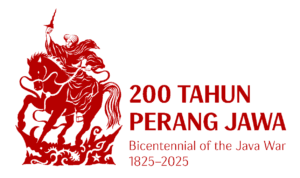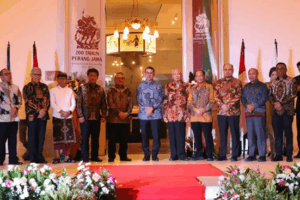Honoring 200 Years of the Java War: Preserving Prince Diponegoro’s Legacy in the Digital Age through the National Library of Indonesia’s Commitment to SDG 11
15 September 2025
In 2025, Indonesia marks two centuries since the outbreak of the Java War (1825–1830), one of the most significant uprisings in Southeast Asia against colonial rule. Led by Prince Diponegoro, a charismatic figure from the Yogyakarta sultanate family, the war was more than a military conflict – it was a profound assertion of dignity and national identity. Two hundred years later, the spirit of that struggle continues to inspire the National Library of Indonesia (NLI) to revive historical awareness.
To honor this milestone, NLI launched a month-long series of programs under the title “The Bicentennial of the Java War 1825–2025”. Branded with the theme Martabat (“Dignity”), the commemoration integrated history, literature, arts, and community engagement. Anchored in NLI’s 2025 vision, “The Library is Present for the Nation’s Dignity”, the programs aimed not only to remember the past but also to encourage reflection on how historical values can guide future generations.
Libraries as Custodians of Indonesia’s Cultural Heritage
The Martabat exhibition, held from 20 July to 20 August 2025, showcased manuscripts, artefacts, and archival materials from NLI’s collection, alongside loans from the National Museum, the Yogyakarta Sultanate, and international partners. It invited visitors to explore the moral and cultural dimensions of Diponegoro’s struggle within Indonesia’s broader fight for dignity and independence. A central highlight was the Babad Diponegoro, the prince’s autobiography composed during his exile in Manado (1831–1832) in Pegon script, inscribed on UNESCO’s Memory of the World Register in 2013, displayed in both original and digitised forms for wider accessibility.
Complementing the physical displays, a virtual exhibition was launched on Google Arts & Culture, enabling global audiences to engage with this pivotal chapter of Indonesia’s past. Curated into four thematic sections—Mustahar (The Prince’s Early Life), Perang Sabil (A War for Honour), Muslihat (The Warrior’s Final Stratagem), and Lentera Bangsa (The Eternal Flame)—the exhibition showed how Diponegoro’s resistance transcended armed conflict, becoming an enduring moral and cultural legacy.
Creative Engagement Arranged by NLI
To bring history to life, NLI staged Five Fragments of the Java War, a theatrical production directed by Wawan Sofwan exploring Diponegoro’s inner thoughts and strong beliefs. Workshops such as the Pegon Script Calligraphy Workshop and Jamu Diponegoro (traditional herbal) highlighted the cultural heritage of his era. NLI also published Babad Diponegoro and Sketsa Perang Jawa 1825 by Joyodiningrat, and a forthcoming 25 comic series of Prince Diponegoro aimed at younger readers. Youth engagement was further strengthened through various competitions for students and public, all centered on the Java War as a unifying theme.
Dialogue and Reflection: Diponegoro on Screen, Books and Talkshow
As part of this event, public forums encouraged dialogue and reflection on Diponegoro’s legacy. A special film screening presented documentaries and an animated feature on Prince Diponegoro, followed by discussions with the filmmakers. A book discussion revisited primary sources of the Java War, including the translation of Babad Diponegoro and Sketsa Perang Jawa 1825 by Joyodiningrat, examined by historians who offered critical insights into these texts. A talk show further connected Diponegoro’s values of dignity, moral courage, and resilience with contemporary issues. Together, these sessions created dynamic spaces for critical exchange, encouraging audiences to link historical memory with present-day values.

Digitisation and Advancing SDG 11
Recognizing the role of digital access in heritage preservation, NLI complemented its events with a podcast series produced by Pujasintara (center of library service dan nusantara manuscript), featuring historian Peter Carey. The series offered engaging storytelling that reinforced the library’s role in heritage education. NLI also transformed ancient manuscripts into modern formats, publishing them as digital books on iPusnas and adapting them into illustrated children’s books and comics to make centuries-old treasures accessible to youth.
These digital initiatives align with the United Nations Sustainable Development Goals, particularly Goal 11: Sustainable Cities and Communities. In line with target 11.4 — which calls for safeguarding cultural and natural heritage — NLI’s programs represent a long-term commitment to preserving Indonesia’s history. More than a repository of memory, the library reimagines heritage through diverse events and creative formats, ensuring the past is not only safeguarded but also enjoyed and shared by present and future generations.
A Living Legacy
The Director General of the National Library of Indonesia, Prof. E. Aminudin Aziz, emphasized that the spirit of Diponegoro’s struggle lay in his demand for respect—a message highlighted by historian Peter Carey and one that continues to inspire the library’s transformation under the theme Libraries Are Present for the Nation’s Dignity. Through Martabat, the library affirmed its role not as a passive repository, but as an active cultural institution and guardian of memory, ensuring that Diponegoro’s values of dignity, moral courage, and resilience are carried forward to future generations.

Contributed by Restu Putri Sholikhah IFLA Asia-Oceania Regional Division Committee for Indonesia 2025-2027, Inclusive Services Librarian, National Library of Indonesia and Hurin Anindia Aghnia, Librarian, National Library of Indonesia